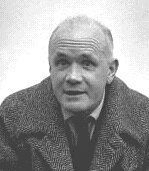On another note, Ellis Sharp wonders what percentage of This is Not a Novel is straight-up erroneous. I would wager between 10-15% but frankly, do not care. It's not like the pleasure of reading this (not)novel stems from expanding one's bibliographical, oracular authority beyond the coctail soundbite or the gossip-quality of exotic reference–one might even say their constant and simultaneous trivialization and elevation to narrative norm is no small part of the point (about which more in a minute).
Still, the (not)novel frustrates me too, both at a surface annoyance level and for reasons perhaps best expressed by others. But also because it eludes classification and casual dismissal, for instance as mere form of mechanical repetition or photocopying, or mental masturbation. There is an art to David Markson's (not)novels, not least of all an extraordinary tenderness and humor, and not only in the presence of playful juxtaposition but more significantly as the heroic element of writing, even in soundbites and anecdotes and borrowed words, inevitably comes through. It reveals itself through thematic repetition, surely, but also in constant interruption, and in the subtlety of persisting in what might be called, for lack of a better phrase, the silent questioning that lies at the heart of 'literature' itself: as Blanchot speaking of Foucault might have said, the miracle and madness of "I speak." But also, why care?
Ellis wishes to set the record straight about Jean Genet's alleged Nazi collaboration (having arrived at this word, Ellis may not appear to have much interest in exploring what it might have meant in Genet's specific context–or indeed why the rumor may have any legs at all–but that aside). I had always thought something of the sort was at least half-self-acknowledged (for instance in Funeral Rites), but I have to trust Ellis's knowledge of the latest biography, I suppose. I certainly don't mean to trivialize it, of course, but in the context of Markson's novel it does seem an accusation operating rather already on the plain of common (coctail) knowledge (that is to say, also, in the absence of argument or linear narrativity, in Markson's hands, on the plain of what may still resist, or defer simplistic judgement). It is at least familiar gossip, taking part in the currency of what is common (if commonly erroneous) enough. For instance, just the other day:
"Him too? Jean Genet, saint and martyr for an entire epoch, was also a Nazi?" asks Jürg Altwegg, reviewing Ivan Jablonka's biographical study "Les vérités inavouables de Jean Genet" (Seuil). In the 1950s, Jean-Paul Sartre elevated the French dramatist to "Saint Genet, actor and martyr". Later, Michel Foucault saw in Genet the figure of a lunatic and criminal created in the mould of inhuman institutions. Jacques Derrida, for his part, exalted Genet's "subversive instinct". Now this myth is being subverted. "Jablonka's study reveals that Genet's legends and lies are at least partially rooted in the Second World War. Before chanting hymns to Palestinian terrorists and the Baader Meinhof Gang, Genet had sung praises of Hitler and the Nazis no less enthusiastically than Louis Ferdinand Céline. Genet was the lover of a French SS officer. He raved about 'blonde warriors' and praised the massacre at Oradour as pure 'poetry'. For Jablonka, Genet's Nazi leanings were the result of an 'intellectual and erotic fascination'. He did not expect anything good from Hitler, he was just delighted by all the horror."
If we are to believe that every act of writing contains en element of auto-biography, including Funeral Rites and This is Not a Novel, then it is perhaps ironic that on the last page the (non)protagonist who has come to be known, like Nabokov's butterflies, as simply "Writer" announces, in a moment that seems marked by both a sort of preemptive blackmail and poignant directness: "Writer's cancer....Farewell and be kind."
And with that the reader, always, in principle, just (democratic?) anyone, (Hugh Person...Hello Hugh) is thereby encouraged to begin, the endless task, not quite thinking and somewhat less than entirely self-assured, yet again.


No comments:
Post a Comment